Stories about... The Micro and Nanotechnology Laboratory (MNTL)
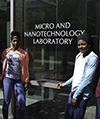 MNTL Day Exposes UHS Students to Nanotechnology Research During I-STEM’s Summer Multidisciplinary Camp
MNTL Day Exposes UHS Students to Nanotechnology Research During I-STEM’s Summer Multidisciplinary Camp
September 29, 2017
On Tuesday, August 8, MNTL Day, the 27 Urbana High School (UHS) student athletes who participated in I-STEM’s pilot summer camp: A Multidisciplinary STEM Program, visited MNTL (the Micro and Nanotechnology Lab), for “A Primer on Semiconductors.” Students had the opportunity to hear from each of the eleven P–20 STEM teachers who participated in the nano@illinois Research Experience for Teachers (RET), funded by the National Science Foundation where they did cutting-edge research in nanotechnology under some of Illinois’ premier researchers in the field. In the afternoon, Dr. Mark McCollum led students on a tour of MNTL’s cleanroom laboratory.
 nano@Illinois RET Exposes Teachers to Cutting-Edge Nanotechnology Research—Who, In Turn, Introduce It to Their Students
nano@Illinois RET Exposes Teachers to Cutting-Edge Nanotechnology Research—Who, In Turn, Introduce It to Their Students
September 18, 2017
In its fourth and final year, the nano@illinois Research Experience for Teachers (RET), funded by the National Science Foundation, offered eleven P–20 STEM teachers the opportunity to do cutting-edge research in the field of nanotechnology under some of Illinois’ premier researchers in the field. The second emphasis of the RET was for teachers to develop modules related to their research that could be used in their own and other classrooms. The goal of the RET is that, based on teachers’ resulting enthusiasm, content knowledge, and increased familiarity with possible careers in the field, along with the modules they develop, which will be available for use by other teachers as well, a larger number of students will be exposed to the field.
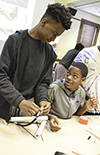 I-STEM Multidisciplinary Summer Program Exposes UHS Athletes to Different STEM Departments/Units
I-STEM Multidisciplinary Summer Program Exposes UHS Athletes to Different STEM Departments/Units
September 12, 2017
Twenty-seven Urbana High School (UHS) athletes, mostly underrepresented minorities, participated in the first-ever I-STEM Summer Camp from August 7–18. The goals of this multidisciplinary summer program were to 1) expose participants to various STEM fields so they know what their options are when choosing their career/ college path; 2) to build teamwork and lab skills in different STEM disciplines; and 3) to allow students to experience what STEM research is about. Ten different STEM departments and units on campus were each responsible for one day of activities during the two-week camp.
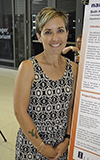 nano@illinois RET Teachers Discover Nanotechnology's Big Impact—Hope Their Students Will Too
nano@illinois RET Teachers Discover Nanotechnology's Big Impact—Hope Their Students Will Too
August 31, 2016
If you get them hooked early, the kids will think graphene is so cool, and that spark could make them the next big nano scientist.” – Tatiana Stine
This summer 11 teachers of varying grade levels and backgrounds participated in the nano@illinois Research Experience for Teachers (RET) funded by the National Science Foundation. While participating in research in a wide range of areas, these teachers’ eyes were opened to the intricate world of nanotechnology and all the possibilities it offers. But while the research is important, that’s not the program's only goal. It is expected that these teachers will then take all that they learned through their research on nanotechnology and, with support from staff and other teachers, translate it into lesson modules they can use with their students back home. It is hoped that as they are able to successfully teach their students what they’ve learned, they’ll not only be exposing them to STEM, but some of its cutting-edge possibilities, like nanotechnology, that their students may never been exposed to before because of a variety of factors, including their socioeconomic background.
FULL STORY
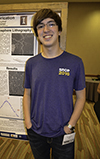 Undergrads Consider Nanotechnology Careers Thanks to nano@illinois REU
Undergrads Consider Nanotechnology Careers Thanks to nano@illinois REU
August 10, 2016
During the summer of 2016, ten undergraduate students learned about nanotechnology as part of the NSF-funded nano@illinois Research Experience for Undergraduates (REU). While spending the summer performing research in the labs of some of Illinois’ premier researchers, the students not only learned a lot about the area in nanotechnology that they were studying; they learned what grad school is like and got some pointers on how to apply. Finally, many of them discovered that they liked research…a lot. In fact, some even decided that the area they researched over the summer was the area they wanted to concentrate on in the future.
FULL STORY
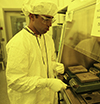 MNTL and its Role in Shaping our Future
MNTL and its Role in Shaping our Future
July 18, 2016
The Micro and Nanotechnology Laboratory (MNTL) at the University of Illinois at Urbana-Champaign, one of the largest and most advanced facilities of its kind in the country, home to 16 cleanrooms, 46 general purpose labs, as well as a biosafety level-2 complex, is playing a significant role in solving real world problems and helping bridge the gap between the developing and developed world.
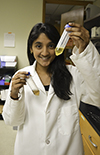 nano@illinois REU Undergrads Experience Growth Via Nanotechnology Research
nano@illinois REU Undergrads Experience Growth Via Nanotechnology Research
August 27, 2015
"I definitely think the best learning experiences are those that push you out of your comfort zone." – Rumya Raghavan
Eleven undergraduate students spent the summer working in the labs of some of Illinois' world-class researchers as part of the 10-week nano@illinois REU (Research Experience for Undergraduates). Not only did participants perform nanotechnology research, but they were challenged both professionally and personally as they learned new things about nanotechnology, about life in a research lab, and about themselves. As a result of their experience, some decided that graduate school might be in their future; some even considering careers in nanotechnology research.
FULL STORY
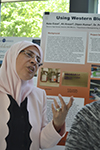 RET Teachers Experience Multidisciplinary Nanotechnology Research via nano@illinois
RET Teachers Experience Multidisciplinary Nanotechnology Research via nano@illinois
August 3, 2015
When the twelve P-20 STEM teachers participating in this summer’s iteration of nano@illinois Research Experience for Teachers (RET) arrived on campus to do research in some of Illinois’ state-of-the-art labs under some of Illinois’ premier researchers, they learned a whole lot about their research topics. And while learning about converting 3D files to DNA brick objects, or receptor differences in cancer cells, or graphene, or that micro cavities can trap light between mirrors, they discovered one overarching fact about nanotechnology research at Illinois: it isn’t all housed in one particular department. While nanotechnology is about things that are really, really small, nanotechnology research on campus is really big and is spread out across numerous disciplines.
FULL STORY
2015 nano@illinois RET Teachers Perform Nanotechnology Research, Make Modules
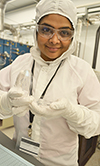
August 3, 2015
Funded by the National Science Foundation, the nano@illinois Research Experience for Teachers (RET) offered eleven practicing P-20 STEM teachers and one pre-service teacher the chance to do research under some of Illinois’ premier researchers in their state-of-the-art labs. Over the next year, teachers are then to develop a module related to their nanotechnology research that can be used in their own or other classrooms. According to Program Coordinator Carrie Kouadio, the RET's main goal is “that the students will be impacted and can benefit from the teacher's increased enthusiasm, higher content knowledge, and ability to direct them in considering careers.”
FULL STORY
 Local Biology Teacher to Introduce her Students to Research on Quantum Dots
Local Biology Teacher to Introduce her Students to Research on Quantum Dots
July 10, 2014
“I teach in a very small school with limited resources," says science teacher Aubrey Wachtel, "so one of the best things that I can do is have experiences and then bring them back to the classroom." So this summer, Wachtel is experiencing nanotechnlogy while researching quantum dots."
FULL STORY
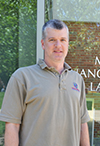 Local Science Teachers Experience Research in NanoTechnology
Local Science Teachers Experience Research in NanoTechnology
July 9, 2014
For the next three years, a number of area science teachers will have an opportunity to participate in the Nano@illinois RET, where they will not only learn about, but actually participate in, cutting edge research in nanotechnology and even adapt some of what they have learned for students in their classrooms.
FULL STORY
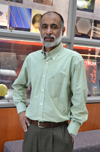 The Face of Nanotechnology at Illinois, CNST Promotes Interdisciplinary Collaboration
The Face of Nanotechnology at Illinois, CNST Promotes Interdisciplinary Collaboration
September 14, 2012
Illinois' Center for Nanoscale Science and Technology (CNST) works to provide training and to foster collaboration in nanotechnology at the intersection of engineering and biology. Why should engineers need to learn about biology? According to Irfan Ahmad, Executive Director of CNST, the national academies have identified the 21st century as the century of biology.
FULL STORY
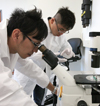 B3 Summer Institute Provides Interdisciplinary Training
B3 Summer Institute Provides Interdisciplinary Training
August 28, 2012
"So it's a good two-week, very intense, but very "get-your-feet-wet" sort of experience. The speaker list is phenomenal... You name the campus, and you've got all the big leagues from anywhere, from this campus and other campuses all over." Irfan Ahmad
Nicknamed B3SI by the planners, the two-week-long BioSensing BioActuation BioNanotechnology Summer Institute 2012, held at the Micro and Nanotechnology Laboratory (MNTL) from July 30–August 10, 2012, was intended to train participants at the intersection of biology and engineering and to foster networking with other researchers...
FULL STORY
 New Center for Agricultural, Biomedical, and Pharmaceutical Nanotechnology (CABPN) To Target Biotechnology
New Center for Agricultural, Biomedical, and Pharmaceutical Nanotechnology (CABPN) To Target Biotechnology
February 10, 2011
The new Center for Agricultural, Biomedical, and Pharmaceutical Nanotechnology (CABPN) is an NSF Industry/University Cooperative Research Center designed to enable discovery and innovation through collaboration. CABPN's mission is to conduct industrially-relevant fundamental research into applications of nanotechnology in the fields of drug development, agriculture, and medical technology; to facilitate technology transfer to industry; and to enhance graduate education and research.
FULL STORY













.jpg)
















